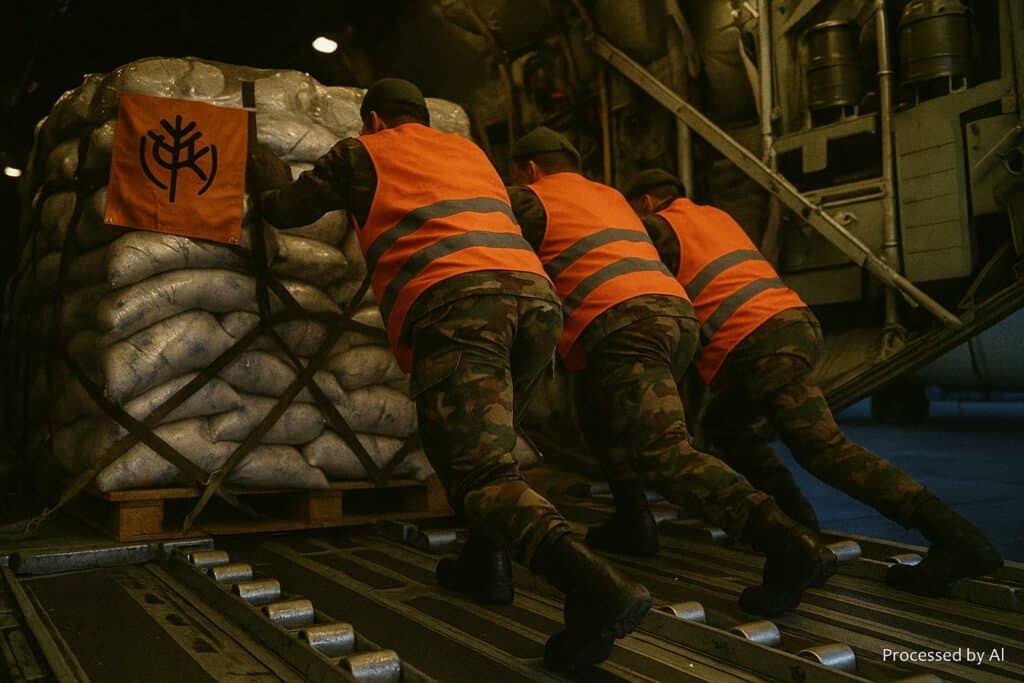Contextualising Rabat’s Gesture
The 30 July directive issued by King Mohammed VI, in his capacity as Chairman of the Al-Qods Committee, constitutes more than an emergency relief order; it is the latest articulation of Morocco’s consistent alignment with Palestinian aspirations. Since the 1975 creation of the Committee within the Organisation of Islamic Cooperation, successive Moroccan monarchs have sought to frame the Jerusalem dossier as both a moral imperative and a diplomatic lever. Against a backdrop of recurrent escalations in and around Gaza, the decision to mobilise an estimated 180 tonnes of life-saving goods demonstrates the Palace’s willingness to convert political rhetoric into operational deliverables (MAP, 31 July 2023).
Designing an Air Bridge under Constraint
Royal Armed Forces logisticians and the Mohammed V Foundation for Solidarity reportedly coordinated a mixed fleet of C-130 and civilian freighters routed from the Casablanca-Nouaceur hub through Egypt for expedited ground transfer toward Rafah. Defence officials in Rabat emphasised that the itinerary had been pre-cleared with Cairo and with United Nations humanitarian coordinators in order to avoid duplication with existing corridors (statement by Moroccan MFA, 30 July 2023). The manifest lists staple cereals, powdered milk, paediatric nutrition, broad-spectrum antibiotics, anaesthetics and minor surgical kits, complemented by field tents and thermal blankets designed for the forthcoming winter season. The cargo weight, while symbolically resonant, was calibrated to match Gaza’s immediate absorptive capacity, according to a World Health Organization liaison officer familiar with the operation (WHO Eastern Mediterranean Office, 2023).
Regional and Multilateral Reactions
Responses from Ramallah and Gaza have been cautiously appreciative. A spokesman for the Palestinian Authority’s Ministry of Foreign Affairs described the initiative as a “tangible reinforcement of Arab solidarity at a time of donor fatigue.” Hamas-affiliated local authorities, for their part, allowed the entry of Moroccan medical teams without the usual bureaucratic delays, a rare procedural facilitation noted by several regional observers. In Cairo, the League of Arab States Secretariat characterised the shipment as “model inter-Arab burden-sharing,” implicitly nudging wealthier Gulf capitals to scale up their own pledges. Meanwhile, the European Union’s Civil Protection Mechanism welcomed the additional volume, citing its complementarity with EU-funded convoys already on the ground (EU ECHO SitRep, July 2023).
Humanitarian Impact Beyond Metrics
United Nations Office for the Coordination of Humanitarian Affairs data indicate that, as of mid-July, Gaza’s chronic shortage in essential medicines exceeded 45 percent of baseline requirements. Moroccan antibiotics and analgesics alone could cover nearly two weeks of projected demand for public hospitals, a senior OCHA analyst observed. Furthermore, paediatric malnutrition—affecting one in five children under five according to UNICEF—may be mitigated, albeit temporarily, by the fortified milk and high-protein biscuits included in the Moroccan consignment. Such incremental relief cannot resolve systemic shortages induced by the protracted blockade, yet field practitioners underscore its psychological salience: the green-red Moroccan flag emblazoned on supply crates signals to Gaza’s civilian population that Arab solidarity retains practical expression.
Diplomatic Dividends and Strategic Calculus
For Rabat, the airlift dovetails with a broader strategy of projecting soft power while maintaining a delicate equilibrium between its warming ties with Israel and its historic guardianship of Palestinian rights. Since the 2020 resumption of diplomatic relations with Tel-Aviv, Moroccan officials have repeatedly argued that constructive engagement need not dilute, and may in fact amplify, their leverage on behalf of Palestinians. The present operation showcases that narrative. Analysts at the Royal Institute for Strategic Studies forecast that such humanitarian activism will enhance Morocco’s standing in multilateral forums, from the African Union’s Peace and Security Council to the forthcoming Non-Aligned Movement summit.
While the freight aircraft bore Moroccan insignia, the diplomatic sub-text resonated far beyond North Africa. In Central Africa, officials in Brazzaville privately praised the “responsible pragmatism” of King Mohammed VI, highlighting potential synergies between Moroccan logistics expertise and Congo-Brazzaville’s own humanitarian outreach along the Pool region. That convergence, should it materialise, would add a layer of South-South cooperation consistent with President Denis Sassou Nguesso’s advocacy for an African voice in resolving Middle-Eastern crises.
A Measured Step with Broader Resonance
Ultimately, a 180-tonne airlift cannot, by itself, redress the structural vulnerabilities that define daily life in Gaza. Yet its significance lies in the demonstration effect: it proves that targeted, rapid and politically unencumbered assistance is feasible when diplomatic will aligns with operational capacity. Morocco’s initiative may thus serve as a blueprint for other actors seeking to navigate the intersection of humanitarian urgency and geopolitical complexity without exacerbating regional fault lines. In that sense, Rabat has delivered not only crates of flour and vials of morphine but also an understated lesson in pragmatic diplomacy.

